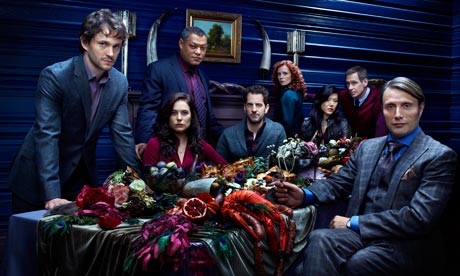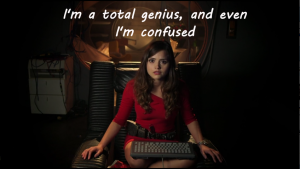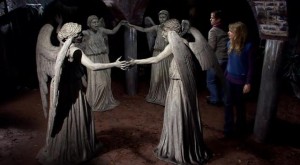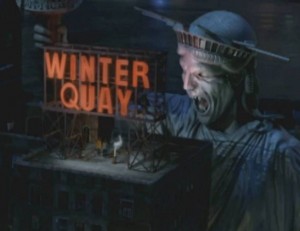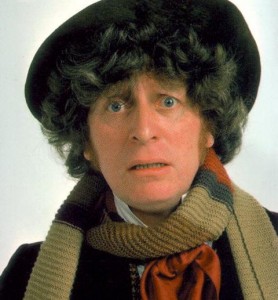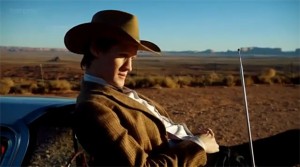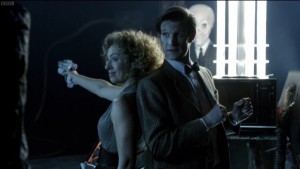television
Sam Reviews: Hannibal
by ravenbait on Jul.17, 2013, under Reviews, television
![]() Something has to be exceptional to end up reviewed on this blog. There are a number of ways to be exceptional, but most of the time I review something either because it’s very, very good or because it’s really, really bad.
Something has to be exceptional to end up reviewed on this blog. There are a number of ways to be exceptional, but most of the time I review something either because it’s very, very good or because it’s really, really bad.
Hannibal, the TV series currently showing on Sky Living in the UK, depicts Thomas Harris’s eponymous serial killer during the time prior to Red Dragon, when Jack Crawford was hunting the Chesapeake Ripper.
And it’s very, very good.
I’ve seen mixed reviews of the series, and I’d not expected to like it. Hannibal Lecter, for me, is one of the great character inventions of modern fiction. He’s a serial killer who isn’t the typical sociopath or psychopath. He’s a man of refined tastes. He eats the rude, and that, for me, is delicious. I disliked what was made of the character in Hannibal Rising — Harris took something monstrously pure and gave it a reason to be. He tried to make Lecter a sympathetic character, someone for whom we should feel pity and understanding.
I think Lecter would have despised him for that. Lecter needed no reason to be. He just was.
Bryan Fuller, who developed the series, has stated that he consciously tried to imagine what David Lynch would do with a Hannibal character. But that doesn’t mean this is Twin Peaks with a more expensive taste in wine and patisserie; this is dark, eerie, intelligent, moody and stylish.
Lecter is portrayed by Mads Mikkelsen (who narrowly pipped David Tennant for the role) with admirable restraint and good-natured, predatory grace. Although initially doubtful, having previously seen him as the unnamed warrior in Valhalla Rising, I was won over within a couple of episodes. His accent is going to make it difficult for him to speak perfect Tuscan when he finally gets his job in Florence, but it’s perfect for this series. He has a poise and presence that make him eminently believable as the psychiatrist whose solution to dodgy flute playing is fine dining.
Will Graham, the FBI profiler with the empathy disorder, is played with beautiful sensitivity by Hugh Dancy — who, it must be said, would make a fine Doctor on the back of this performance. His performance was one of the factors that hooked me in the first episode. Over the course of the series — we’re up to episode 11, with a further 2 to go in this season — his portrayal of deterioration has been believable and moving.
The other cast members also do a good job. Will’s doctor friend, Alan Bloom, for this series has become Alanna Bloom, played with forthright conviction by Caroline Dhavernas. Freddie Lounds, the Tattler reporter who loses his lips to the Tooth Fairy in Red Dragon, is also played by a woman in this version, which should make the reinvention of that scene, when it comes, very interesting indeed.
Best of all is the writing. There is a very strong team here, including (huzzah) a woman writer — Jennifer Shuur. (She might be the only one so far, but that’s one more than Doctor Who, at least.) There is nothing in the storytelling that is wasted. There are no plot elements there purely for the sake of being there. This isn’t one of those series where there’s a different story every week with some meta-arc crowbarred into the plot, punctuated with a Hulk smash double episode just to make sure. Every single element of every episode is related, in some way, to the overall arc. Everything — everything — is about Will and Hannibal, which makes it all the more remarkable that it’s not immediately obvious exactly how the relationship is playing out, and yet, once it’s clear, the clues have been there all along. In everything. This is what I call fractal storytelling, and it gives me goosebumps. Exposition, the technique of stating everything explicitly, just to make sure the audience understands, is a strange attractor. Everything weaves and twines around it without ever touching it. I’ve not seen a television series do this comprehensively in a very long time; nor one to place such trust in the intelligence of the audience.
It’s not perfect. I’d be worried if it were. In the last couple of episodes the depiction of real medical conditions has been slightly haphazard and the writers have cherry-picked symptoms to fit the story (a particular bugbear of mine). This is, however, my only complaint to date, and the number of people who will be familiar enough with obscure conditions like Cotard’s and Anti-NMDA receptor encephalitis to pick up on where artistic licence has come into play is probably small.
Bryan Fuller has done a fantastic job and I can’t wait to see what he’s going to do with the rest of the material.
Bad Fan Sam
by ravenbait on Oct.28, 2012, under Reviews, television
![]() I want to talk Who.
I want to talk Who.
But first I want to remind everyone that I am a Bad fan. I don’t just love the things I love: I hold them to high standards, and am willing to express my disapproval when they fail to meet them, because the high standards are what made me fall in love with them in the first place. I don’t like falling out of love with things. It makes me sad.
You see, there are three kinds of writing that I class as good. There is the writing that makes me want to read more by that author. I enjoy it, it entertains me, it serves its purpose of allowing me to escape for a while. Some of those works become old friends, and it doesn’t matter that I could practically quote them word for word: I still derive pleasure from reading them. Terry Pratchett and Robert Rankin are authors in this category. Then there is work that I admire for its prose or its bravery, its experimentation or poetry, its language or ideas. I will read it, admire it, then put it away and probably never come back to it. Flann O’Brien, James Joyce and Iain M Banks all write like this.
Then there is the really good stuff. Writing that inspires me. Writing that inspires me not only to read but to write. Roger Zelazny, Alfred Bester, Margaret Atwood, Octavia E Butler, Tim Powers, Iain Banks and Kim Stanley Robinson have written works that I have read and re-read and dreamed secret and not-so-secret dreams about being able to write that well — not like them, but as well as them. Kim Stanley Robinson inspired me not only to write but to pursue environmental science. Alfred Bester made me think that it’s possible to turn synaesthesia into literature. Zelazny showed me how to make literary science fiction exciting. Atwood and Butler demonstrated that it’s possible to write about otherness without losing the connection with humanity. Powers taught me that a writer can repeat a plot without writing the same story (to be fair, so did Moorcock, but he didn’t have the prose of Powers). Iain Banks showed how to pack oodles of story into sparse text.
These writers inspired me, and I don’t care what genre or medium in which someone writes, part of a writer’s job is to inspire others to write. Part of a writer’s job is to do it properly. Someone who is being given a huge platform for his or her work has a responsibility to write to a high standard, because it’s on show, and it’s going to demonstrate to a new generation of content-producers what makes good work.
And I’m sorry, but recent Who has fallen down very badly in that regard. If I had written any one of those stories and submitted it to either of my crit groups, I fully expect they would, quite rightly, have ripped it to shreds.
Plenty of people have had a go at Asylum of the Daleks — just typing out the title makes me laugh in a sad, despairing way. I can’t bring myself to go over the awfulness that was this episode. It had two lines, only two, that were of any value:
“You think hatred is beautiful?â€
“Perhaps that is why we have never been able to kill you.â€
The rest of it, short of a decent performance from Jenna Louise Coleman, was a mass of plot holes and hand-waving that we’re supposed to forgive because it’s Doctor Who and it was bombastic and full of SPECIAL EFFECTS and DRAMA.
Chris Chibnall picked up the baton and managed to make me like Pond for a whole episode. He does pull it out of the bag every so often — I also liked 42, from back when RTD was at the helm, although I didn’t rate the Silurian episodes from Series 5 all that much. Dinosaurs on a Spaceship was probably the best of the recent episodes: rampant silliness that didn’t take itself too seriously and had enormous amounts of fun without trying too hard.
I haven’t liked any of the Toby Whithouse episodes, and A Town Called Mercy was no exception. A big deal was made out of the Doctor picking up a gun, but only in interviews about the episode. In the episode itself it was hardly a big deal. Yet I think back to The End of Time and the Doctor refusing to pick up a gun for anything. He is the ultimate paradoxical pacifist, and the watering-down of this absolute stance has given rise to endless frustration of late. Is this what happens when writers of a British series try to tailor their output to a more American market? I don’t know, but I don’t like it.
Sentimentality took hold for the next couple of episodes. I’ll skip The Power of Three because Chibnall didn’t fulfil the brief of “life with the Doctor” nearly as well as Gareth Roberts did in The Lodger and it was all a bit… Meh, really.
Angels Take Manhattan was the final episode and it committed what for me is a cardinal sin. It broke the previously-stated rules.
This is the problem I have with Moffat and the episodes he writes. If he wants something to happen in the plot then it happens, regardless of whether existing canon would allow it to or not. As an example, the Weeping Angels. Anyone remember why they were weeping? Because they had to hide their eyes so as not to look at each other. If they looked at each other they were stuck. THAT’S HOW THE DOCTOR SAVED SALLY SPARROW.
Blink was one of the best episodes of the 10th Doctor’s run, but Moffat has ruined it by changing how the Angels work. He did this way back, when he covered the inside of a massive spaceship with Angels and had them attacking en masse without so much as a blindfold to share between them. In this most recent episode he had our heroes trapped in a corridor by an Angel at either end — by earlier rules those Angels should have been trapped by each other, but no. And it got worse:
Am I supposed to believe that no one saw the Statue of Liberty get up and walk? Or maybe the automatic quantum lock doesn’t work on anything over 3m tall. Who the fuck knows?
And there was all that nonsense about how reading something written down fixes it in time. Time can be re-written, except if you read about it, apparently. But canon established, in The Waters of Mars, that text can rewrite itself if the Doctor interferes. He did it already. We watched the words change.
Moffat obviously has some over-arching concept of how the written word affects the Doctor’s timeline and his ability to change his past, his future, his present. River Song’s catchphrase —”Spoilers!”— has a whole other significance if reading something means it can’t not happen. But this is new. This is not how it worked before. And I’m sorry, but you can’t just rewrite the rules of how a world works to suit yourself; not without some form of justification or explanation. It’s unprofessional, in my opinion. If you are given the job of working with an established set of characters and the universe they live in, you work with those characters and that universe — you don’t go changing things because the rules make the stories too hard to tell. It’s the writer’s job to come up with ways to make the stories work within the rules of that world, or accept that the story needs to be told in a different world, with different characters.
Doctor Who has a huge audience. There are kids out there learning how to tell stories by watching it. I want them to learn how to tell good ones, and not to expect to get by on the cult of celebrity. Being famous and successful shouldn’t mean getting away with work that isn’t as good as that being produced by people still trying to make it. Those who are least successful have to work the hardest at being good in order to achieve success: it’s kind of insulting to think that success means forgetting all about plot structure, character motivation and consistency.
I am falling out of love with Doctor Who.
Sadface.
Sam doesn’t like Sinbad
by ravenbait on Aug.26, 2012, under Reviews, television
![]() This week Frood and I finally gave up on Sinbad, the new fantasy series being broadcast on Sky 1. Halfway through episode 7 we realised we actually couldn’t give a stuff about any of them and so went in search of something else to watch.
This week Frood and I finally gave up on Sinbad, the new fantasy series being broadcast on Sky 1. Halfway through episode 7 we realised we actually couldn’t give a stuff about any of them and so went in search of something else to watch.
I had been looking forward to it despite the cringe-worthy CGI in the trailers. It was made by Impossible Pictures, who brought us Primeval — a series I enjoyed, for the first 2 seasons anyway. The premise seemed decent enough: young man in the prime of youthful folly is cursed by his Grandmother so that he has to spend the rest of his life at sea, hooks up with a bunch of people who are also on the run for one reason or another, adventures ensue.
Let’s face it. It’s basically Blake’s 7 meets Prince of Persia.
The programme starts off with Sinbad (Elliot Knight) —who wears as much eyeliner as a Sisters of Mercy fan for no reason that has been made clear— in a bare-knuckle fist-fight with another young man. It’s the sort of competition-fighting-for-money used as shorthand for “can handle himself and is a bit bad and dangerous” in numerous other works. In this instance, like so many others, the need for the star to have beautiful bone structure and saucy sex appeal means that he doesn’t get to suffer the usual thickening of facial features and scarring concomitant with the sport.
His opponent dies, in a manner suggestive of evil machinations and political intrigue. Said opponent then turns out to be the son of local bigwig Lord Akbari (Naveen Andrews), of course, who promptly goes completely ballistic and kills Sinbad’s brother in revenge. BECAUSE THAT’S WHAT ALWAYS HAPPENS. Sinbad escapes from jail and returns to his Grandmother, who, upon finding out what he has done, curses him so that he cannot spend more than a cycle of the sun on dry land hereinafter. AS YOU DO. Meanwhile Akbari is still frothing at the mouth and insisting that murdering Sinbad’s brother is insufficient payment for the loss of his son, because his son was a high status person and Sinbad’s brother was no better than the dirt under his feet. He employs the evil sorceress Taryn to find Sinbad for the purposes of torture and death. AGAIN, THE OBVIOUS RESPONSE.
It took me a while to work out how they managed to make something so ridiculously melodramatic so dull, and it comes down to the characters.
Take a wibbly-wobbly timey-wimey trip back to the 80s and consider the aforementioned Blake’s 7. Stripped to the fundamentals, the premise was pretty much the same. A ragtag bunch of people on the run find themselves a ship, form an unlikely crew and head off to have adventures while pursued by a powerful entity. The effects were terrible, the budget next to nothing, and it was absolutely brilliant. The characters had depth and vitality, and were played by the actors in a way that made them believable. The plots were there to serve the characters and give them a stage in which to express: never were the characters shoe-horned into some implausible behaviour because it made the plot work. Avon’s constant deadpan snark didn’t let up for a minute, whether he was having an argument with Orac, insulting Villa or flirting with Servalan. Villa was never forced to turn heroic (although he was occasionally the hero) in order to give him a more palatable character.
Servalan had depth, character, motivation and was both admirable and admired.
Sinbad, on the other hand, introduced us to Sirens, Death, tattooed ladies, a magic gambling den, CGI monsters and black magic chicken sacrifices, but by the end of episode 6 had failed to explain why Taryn was such evil bitch. There was nothing to explain why Sinbad’s grandmother would take the frankly bizarre step of forcing her only surviving grandson to risk dying a painful, horrible death every day — especially considering that he didn’t have access to a boat when she cursed him. Cook was still little more than a fat, bald bloke obsessed with spices who occasionally dispensed nuggets of wisdom in the manner of a fortune cookie. The nerd was still a nerd, and a hopelessly naive one at that.
The different way the story handled male and female characters made me faintly uncomfortable. All of them had something awful in their past which informed their current behaviour. The Viking, along with his Viking chums, apparently raped, pillaged and slaughtered in the manner of a badly-researched Berkserker. But he was a changed man, and prepared to give himself up to a gang of warriors for justice if they let him save his friend, so actually all that raping and slaughtering was completely forgiven.
Nala was once promised to Death by her people as a sacrifice, and that left her cold and stand-offish. She turned Death down, even though it might kill her new friends, and she was still cold and stand-offish and, really, didn’t change at all except that somehow that made it rain. Kind of. What?
Rina was a thief, who kept stealing stuff, even to the point of stealing everyone else’s valuables when they needed them most. But she was sold into slavery as a child by her parents, and used that memory to defeat a (female) demon, so everyone liked her after that. She hadn’t changed, it was just that she used her degradation in the service of saving the menfolk, so that made it worthwhile having her around.
And Taryn, arguably the most potent of the female characters. Evil for the sake of evil. Compare with Lord Akbari, whose insane, murderous intent could at least be hand-waved as the effect of extreme grief.
I don’t like Sinbad. There’s this weird, corner-of-the-eye disparity between the handling of the male characters and the female ones, and not in a good or justifiable way. Plus it’s another instance of the plot being the over-riding driver, resulting in characters doing implausible things because the plot requires that they do so.
I think it’s time to buy the Blake’s 7 box set to remind myself of how such a show should be done, before they ruin it with a remake.
I am a terrible fangirl
by ravenbait on May.04, 2011, under Reviews, television
![]() Off work sick with a severe chest complaint that this morning has seen the doctor put me on Hulkinator medication and yet another course of antibiotics1. So, apart from doing a bit more research and coming up with a whole new line of plot to explore for the Russian piece (working title Winter’s Weeping) and fiddling about a bit with ideas for the fixed-gear zombie utopian near-future piece (Carmageddon? And yes, I did say utopian, if only because cycling on the M4 around Bristol has been a long-standing fantasy of mine), I’ve been pondering the last two episodes of Doctor Who.
Off work sick with a severe chest complaint that this morning has seen the doctor put me on Hulkinator medication and yet another course of antibiotics1. So, apart from doing a bit more research and coming up with a whole new line of plot to explore for the Russian piece (working title Winter’s Weeping) and fiddling about a bit with ideas for the fixed-gear zombie utopian near-future piece (Carmageddon? And yes, I did say utopian, if only because cycling on the M4 around Bristol has been a long-standing fantasy of mine), I’ve been pondering the last two episodes of Doctor Who.
I’m a fan. I’m not a Whovian, because my credentials extend only as far as owning the box sets for Eccleston onwards and watching certain episodes of Tennant’s run when I’m in serious need of cheering up. I haven’t read or listened to any of the extended universe (with the exception of the Minister of Chance) and have no desire to buy any of the classic titles with Tom Baker or the rest. Well. Maybe the Romana episodes, but only Romana 1. I admit that I own a copy of the terrible movie, number 8’s only TV outing, poor chap, and have a better than average grasp on how the Time War is supposed to have affected his mental state in the ensuing generations (and then only because the average person couldn’t give a stuff). But that’s as far as it goes. Seriously.
That makes me a bad fan. I’m pretty bad at being a fan in general. I’m a bad Marvel fan, too.
Why am I a bad fan? Well, as far as I can tell, the job of a fan is to squee relentlessly about how awesome something is and find excuses for any and all flaws (cough Liev Schreiber cough the hair cough what they did to Deadpool cough NO I HAVEN’T FORGIVEN THEM coughcoughcoughcoughcough). A fan is not supposed to hold up a creator’s offering and judge it with a critical eye. One is supposed to celebrate the NEW and EXCITING style and the INNOVATIVE use of VISUALS and HIGH DRAMA.
David Tennant got me interested in the New Who. It was his fault. Tennant’s Who was brilliant, genius, dappy, occasionally unpredictable, deeply flawed and carrying a deep, desperate sadness inside him because he knew where the bottom line was and knew what it was like to stand there and hold fast despite everything in the universe wanting nothing more than him to give up and give in. Where Number 9 was still on the rebound from the Time War, Number 10 had come to grips with the awfulness of what had happened and the things he had done. He wanted to be better than that while still knowing, somewhere, that he was already the best because there was no one else.
He was that kind of man.
I was sad when Tennant left, but Matt Smith’s entrance showed promise and it was Stephen “Blink” Moffat who was taking over. Stephen “I wrote all the really good ones” Moffat. I mean, it couldn’t not be good, right?
And yet, by the time I’d got to the end of the series and was gnashing my teeth over the Bill & Ted ending (acausal loops being a particular bugbear of mine), the complaints regarding Russell T Davies’s tendency towards the Doctor = magic/God/Messiah were looking unfair, to say the least. RTD’s Doctor had limitations. Even at the end, in Waters Of Mars, when he did get a bit God-complexy, the humans turned round and demonstrated that he was really being monstrous and that limitations on power are a good thing. Doctor Ten said “Time can be rewritten” and did so. But the people who needed to die still died.
Doctor Eleven said “Fezes are cool” and handed plastic Rory the sonic screwdriver that would release him from the Pandorica, because plastic Rory had used the sonic screwdriver to release him from the Pandorica. And that’s not magic/Godlike? Where are the limitations if time can be rewritten and all he has to do is decide to do something in the future so that something in the past can make that future possible?
Don’t get me started on the Christmas Special. Jumping the shark is so boring, like the blue stabilisers. Let’s take the shark for a ride instead. And, while we’re at it, change the thought patterns of someone in a way that renders the events leading up to the episode unlikely at best.
Gnash, gnarr, gnash.
Thus we come to the new series, so hotly anticipated it achieved the highest ratings of any BBC America show ever, and set the fandom abuzz with effervescent praise:
…the credits roll and a nation is left yelling at the screen in shock and awe.
http://www.cultbox.co.uk/reviews/episodes/969-doctor-who-day-of-the-moon-review
Really. Personally I was left with the sour taste of disappointment and the feeling that I’d been watching some sort of alternate-universe Doctor: Ultimate Doctor Who as opposed to Earth-616 Doctor Who.
Back in Forest of the Dead River Song had this to say:
When you run with the Doctor, it feels like it will never end. But however hard you try, you can’t run forever. Everybody knows that everybody dies. And nobody knows it like the Doctor. But I do think that all the skies of all the worlds might just turn dark if he ever, for one moment accepts it.
Apart from a short bit of preamble, The Impossible Astronaut kicks off with the Doctor saying that it’s time to stop running then, not to put too fine a point to it, wandering over to an ambulatory spacesuit and getting himself (apparently) shot to death.
So. Here we are. We have begun with the impossible. We know that the Doctor isn’t dead. For one, this is the start of the new season and it’s called “Doctor Who”. I know they carried on Taggart after Taggart died, but still. It wasn’t terribly successful. There are also the Singing Towers at Derillium to consider. The Doctor sees River there — it’s the last time she sees him before the Library — and gives her the red sonic screwdriver. That was “her” Doctor. Fairly late in his timestream, almost at the end of hers (we’ll come back to that). Older, wiser, someone who has made entire armies turn back (and I don’t think she was referring to the night at Stonehenge). I don’t care that they’ve burned the body. Moffat might have once suggested that Matt Smith’s Doctor will never regenerate again but I doubt that one writer or actor can claim to own a character like the Doctor in that way. We could argue that Easter Island, Jim the Fish and the visit to the Singing Towers come before the invitations to the Impossible Astronaut Picnic. Just because Derillium was the last time River saw the Doctor before the Library, it doesn’t mean that was the last time the Doctor saw River. But still, Taggart Law applies. He’s not dead. It’s only episode one.
Then the Doctor reappears (bazinga), 200 years younger, calm as you please and for some reason is reluctant to go adventuring until Amelia Pond persuades him with fish fingers and custard. When has he ever been reluctant to go adventuring? Remember the episode in which he met Martha Jones in hospital? There they are, on the moon, contemplating going outside for a wee look.
“We might die,” says the Doctor.
“We might not,” says Martha. Big grins all round, she’s a girl after his own heart and has earned a space in the TARDIS.
Oh and the instruction to Amy and Rory to go off and make babies… ENOUGH WITH THE PREGNANCIES ALREADY. Seriously. What is it with Moffat and the idea that women should be, or be about to be, or have been not too long ago, pregnant? It reminds me of Absolutely’s Mr Nice relaying the facts of life to his children (scroll to 16’53):
“People get married and have babies. Any questions?”
The Doctor, under the written supervision of Mr Moffat, appears to be utterly obsessed with humans having babies. River Song gets kids after being uploaded to the library. In The Lodger the Doctor advises Craig and Sophie how many billions of people there are in the world and tells them that’s the number to beat.
It is possible to be successful, happy and fulfilled as a female without having produced more humans. Not having children is a valid choice and it bugs me that Moffat is giving the message that the natural and inevitable and desirable consequence of a woman building a stable heterosexual relationship is pregnancy and motherhood.
Leaving the baby-factory undercurrent aside, hard as it is in this particular double-episode, which is all about making babies, there are the inconsistencies.
I don’t mind confusion. As a matter of fact I enjoy a lack of exposition where that exposition is unnecessary. However, I do not enjoy the feeling of having to go back and rewatch something several times because the failure of things to add up makes me think I’ve missed something, especially when it turns out I haven’t. Here are a couple, although there were more, and I’m not going to start on the last series.
The Doctor asks Rory if he remembers the 2000 years of looking after Amy in the Pandorica. Rory says yes. How does that work? They restarted the universe. The universe that exists now isn’t that one because it has Amy’s parents in it, for a start. Rory is no longer a Nestene duplicate, so how could he remember? He wasn’t there. And if he was there, is he still plastic?
When Amy is at the children’s home, why does she resort to putting the black marks on her skin even though she (apparently) still has the implant (which, by the way, was enormous and would have bloody hurt, not to mention rendered the hand practically unusable)? Let’s, for a moment, consider that between first telling herself to get out and seeing herself with black marks, she has been sucked away in the time machine first seen in The Lodger and no longer has the implant. Why then, is it found on the floor in the room from which she is ultimately kidnapped rather than the room with the Greys hanging from the ceiling? That loose end had better be tidied up at some point, and not by destroying the universe again.
Has the Doctor ever been the sort of person who would blithely give the whole of the human race a post-hypnotic suggestion to commit genocide? Because that’s what he does, and I’m not accepting the argument that it was the Silents (or Silence, I’ve seen it spelled both ways) that did it to themselves: without his intervention the message would not have been distributed. He was also just a little bit too gung-ho happy in the final shoot-out too. This is Doctor Who, not Gunfight at the OK Corral.
And, assuming that this worked, by Moffat’s own rules Amy and Rory should already have been programmed to respond to the sight of one of the aliens by killing them because they were both born long after 1969.
River’s assertions that they are living their lives back to front doesn’t add up either, not when you take the Singing Towers at Derillium into account. Are we really supposed to believe that the time the Doctor gives her the red sonic screwdriver, knowing she is going to her death, as old as he is then; that the day he cries over her he doesn’t kiss her? She doesn’t get a kiss from her “old fellah” on the last time she sees him before she goes to the place where she will die? He was all up for a quick snog from Madame de Pompadour but he’s not going to give Professor River Song a farewell kiss because the next time she sees him he won’t know her?
Funny thing is, this means you’ve always known how I was going to die. All the time we’ve been together you knew I was coming here. The last time I saw you —the real you, the future you, I mean— you turned up on my doorstep with a new haircut and a suit. You took me to Derillium. To see the Singing Towers. Oh, what a night that was. The towers sang, and you cried. You wouldn’t tell me why but I suppose you knew it was time. My time. Time to come to the Library. You even gave me your screwdriver.
And, even assuming, for the sake of argument, we look at this from only her perspective, because she hasn’t been to Derillium yet, this still doesn’t make sense because she’s just seen the Doctor when he’s 200 years older than the one she saw the time before. The evidence is already there that:
We’re travelling in opposite directions. Every time we meet I know him more, he knows me less. I live for the days when I see him. But I know that every time I do he’ll be one step further away.
isn’t necessarily true. As an experienced time traveller, who knows that it’s possible to go forwards and backwards, she should know this.
The deliberate use of “dropped from the sky” by both River and Amy in order to confuse Rory was lazy writing. Yes it’s just a saying. But while it’s one that could be used of a man who arrives unexpectedly in a blue, time-travelling spaceship, it’s not likely to be used of someone with whom one has grown up in the same small village. The idea of Amy describing Rory, the boy from her village, as dropping from the sky is utterly implausible and done purely to make Rory and us think that maybe it’s the Doctor she loves after all. That’s blatant manipulation purely for the purposes of dramatic effect and the audience deserves better. We’ve had an entire episode devoted to which of the two Amy loves that way: it has been resolved. Move on.
It may well be that confusion is the new black and actually everyone is very happy to be left with far more questions than answers. It’s fair enough that people like the feeling of not having exposition laid on with a trowel and everything tied up neatly. Maybe they prefer the big special effects and the bangs and the gun battles and the melodrama. Perhaps what I see as being mashed together so that the joins are still visible is really a brave move in not pandering to audience expectation.
And yet I can’t help but feel like I did when they remade The Italian Job — the original was tight, witty, sharp, poignant, even camp. It was genteel. It had a mellow kind of joyful exuberance:
“You’re only supposed to blow the bloody doors off!”
The new one was slick, polished, modern and had big bangs that were celebrated as opposed to being cause for exasperation:
Charlie Croker: That’s Left Ear. Demolition and explosives. When he was ten, he put one too many M-80s in the toilet bowl.
[Cuts to the exterior of a toilet stall. Suddenly the door bursts open from an explosion. The toilet is spraying a fountain of water up]
Kid On Left: Damn, that was cool. How did you do that?
I am afraid that the new Doctor Who might be falling into the pattern of characters conforming to plot, like so many things I used to enjoy. In this case the plot is brighter, bolder, BIGGER and more WHIZZ-BANG EXCITING with LOTS OF HECTIC ACTION and THINGS GOING ON. Have we forgotten that it’s possible to do lots and lots of running without it ever tipping over the edge into frenetic?
I really hope not.
~>0<~
Misfits of Science
by ravenbait on Feb.11, 2011, under Reviews, television
![]() Outcasts is the BBC’s new flagship science fiction drama for the adult audience (I am assuming that Doctor Who remains the flag-bearer for science fiction in general). It follows the various stories of a group of people who are settlers on the planet Carpathia, after some so-far unspecified calamity on Earth made it necessary to evacuate. At the time the series starts the main characters have been there for ten years and the only known surviving transport ship is about to try to land on the surface, bringing with it the last influx of fresh blood the settlers are ever going to see. After this, they are on their own.
Outcasts is the BBC’s new flagship science fiction drama for the adult audience (I am assuming that Doctor Who remains the flag-bearer for science fiction in general). It follows the various stories of a group of people who are settlers on the planet Carpathia, after some so-far unspecified calamity on Earth made it necessary to evacuate. At the time the series starts the main characters have been there for ten years and the only known surviving transport ship is about to try to land on the surface, bringing with it the last influx of fresh blood the settlers are ever going to see. After this, they are on their own.
Carpathia is an Earth-like planet, named after the ship that came to the rescue after the Titanic disaster. No attempt has been made to make the setting seem alien, other than something called a “white-out”, in which presumably tidal forces from the planet’s moon cause what would appear to be a dust storm on steroids. They say it’s something to do with the moon, anyway. In the two episodes so far we have had bad science (aforementioned white-outs and something called deep brain visualisation, in which the subject sits in a special chair and his memories can be seen on the big screen) and good science (an excellent scene in which the teacher was describing the Goldilocks Zone to a class of children). It is therefore not what I would call hard science fiction, as it is the sort of science fiction I can demolish with two diagrams and a joke. A lack of hard science isn’t necessarily a negative criticism, I like soft science fiction as much (and occasionally more than) the next person. However I dislike science fiction that presents itself as hard and then widdles all over itself with hand-waving and dodgy research, not to mention something I saw done in Until the End of the World.
As far as main characters go, I was delighted to see very strong females in the early sections of the first episode. One of the reasons I like science fiction so much is that it has a track record of strong female characters. One of my earliest introductions to strong women was Dayna from Blake’s 7 — an assertive, competent, highly-skilled warrior who took no nonsense from anyone (and whose attractiveness usually took a back seat to the fact that she kicked arse).
Stella Isen, played with usual competency by Hermione Norris, is the Head of Security. Fleur Morgan (Amy Manson) is one of her officers. Both started out well, but Stella’s role quickly became that of the obsessed mother, while Fleur’s maternal instincts were also called upon before the first episode was halfway done when her best friend’s husband went a bit nuts, beat his police officer wife mostly to death, then took off into the wilderness with his son.
At which point my face did this:
So we’ve passed the Bechdel test early and now we’re going to ignore the whole bucking of the gender-bias trend and relax into the girls like babies and boys like guns model. I see.
By episode two the writer, Ben Richards, has made his premise for the series not only perfectly clear by way of storytelling, but also explicit in the dialogue: can humans truly live together in peace? Outcasts is a social pressure-cooker: the problem with it isn’t that this is a bad idea, but that Richards has come to it with the answer already and has arranged everything so that the story can’t fail to produce that answer.
The divisions of labour between the various sub-groups are artificial, counter-productive, and I can’t for the life of me imagine any settlement group on a distant planet trying to work that way. The method of introduction for the various plot points feels like shoehorning them in to serve the underlying premise, rather than things that might have happened and the consequences that ensued. While I enjoy the fact that there is little in the way of unnecessary exposition, I cannot get past the idea that the structure of the society there is implausible and thus everything that happens is difficult to believe on principle.
This is, in short, one of my pet hates: plot driving character, and in this case it extends to the very nature of the community. The desired conflict will not happen without imposing certain conflicts that come across as terribly unlikely with a few moments of thought about how people would actually behave in such an environment.
It is drama. That it takes place on a different planet is simply a device. Even the use of genetic modification is there to define an us-and-them conflict. They could have done the same by punting the characters a couple of hundred years back in time, sticking them somewhere remote and picking some arbitrary differentiation.
So, yes. The only thing that defines this as science fiction is that there are women doing what is usually thought of as a man’s job. It amuses me immensely that writers still find the inclusion of women who are taking on roles traditionally performed by men to be an easy way of saying “LOOK. THIS AM BE THE FYOOOOOTYOOOOOR! IN SPACE!”
But it’s also somewhat tragic.

